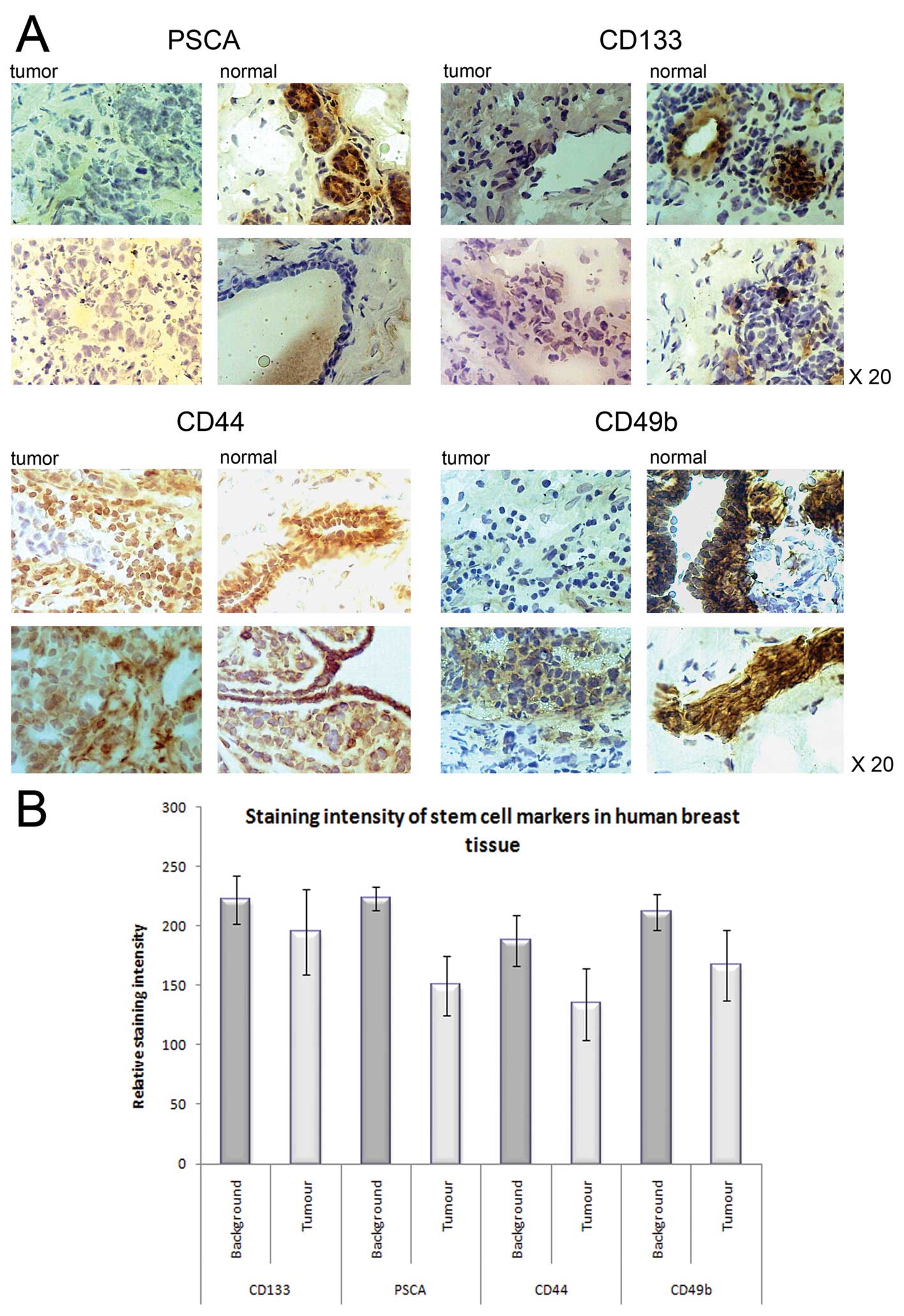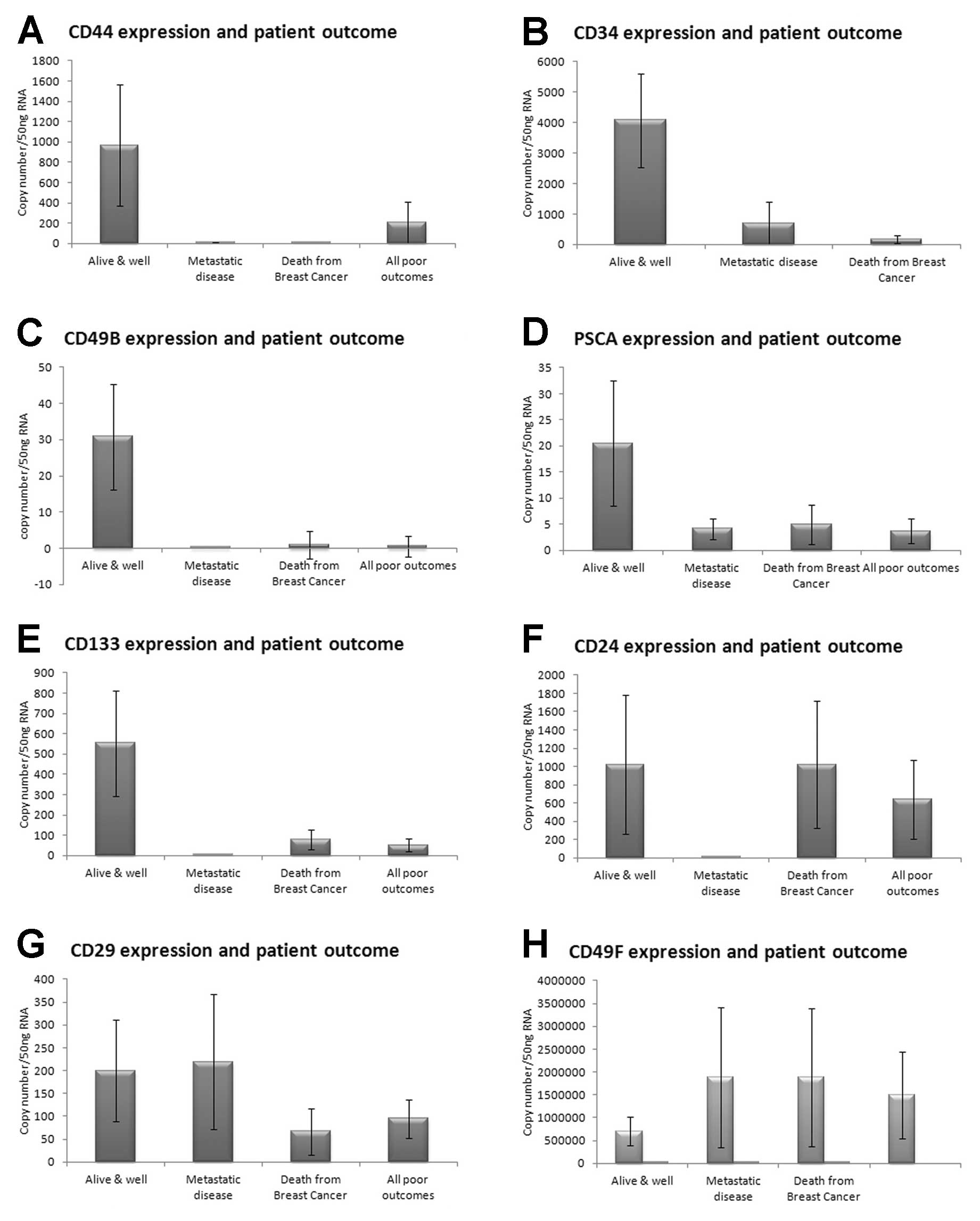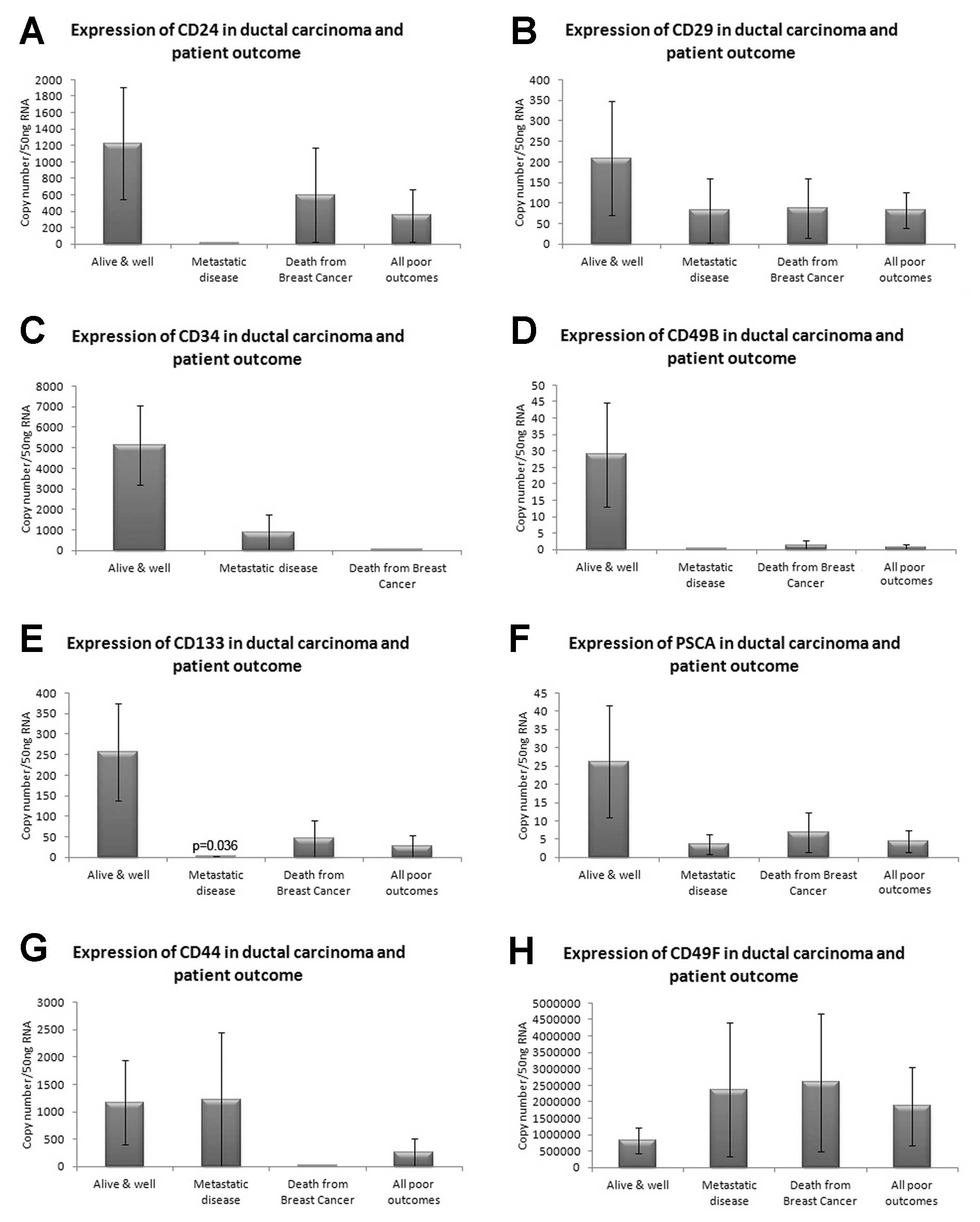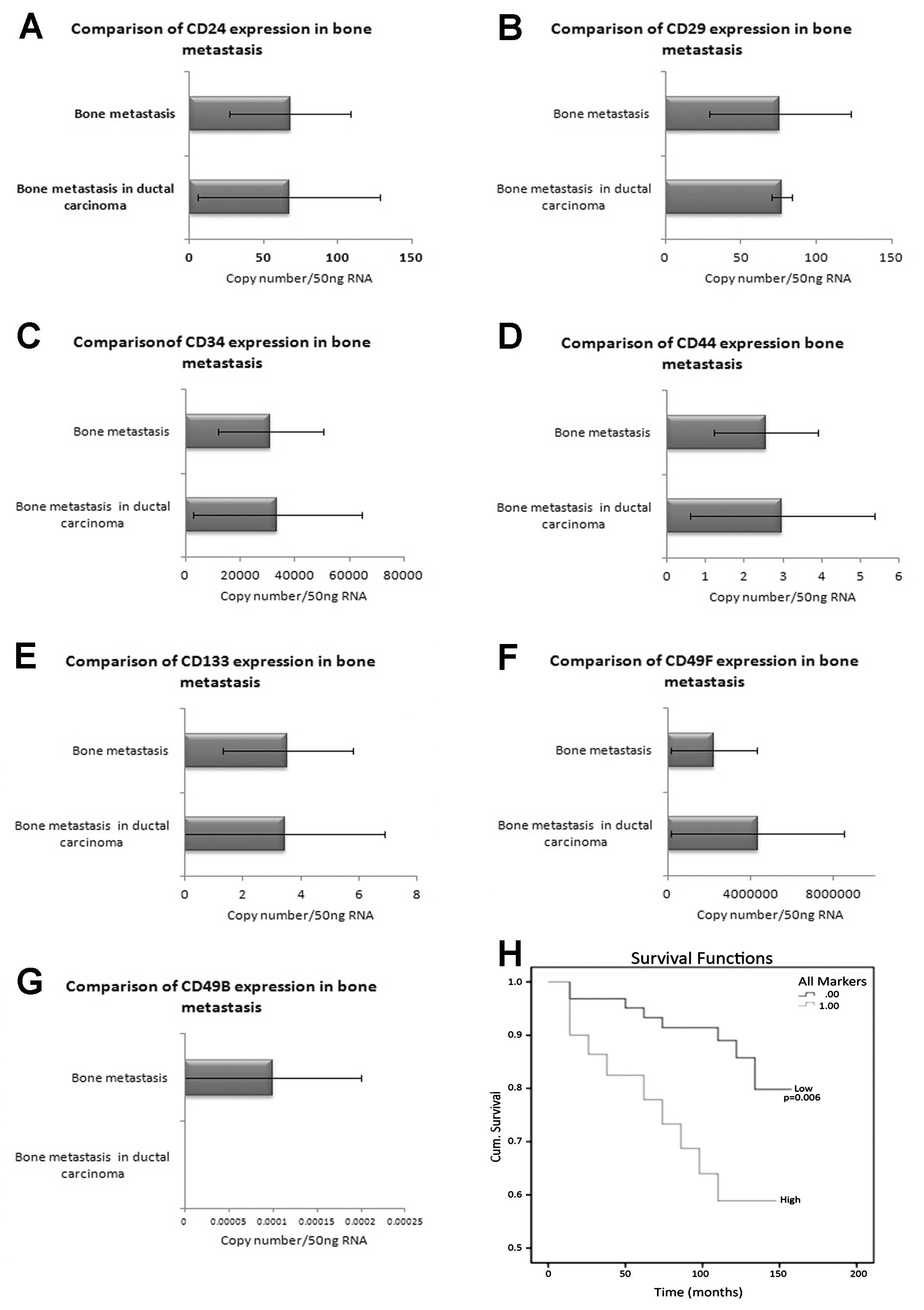|
1
|
Donnenberg VS, Donnenberg AD, Zimmerlin L,
Landreneau RJ, Bhargava R, Wetzel RA, Basse P and Brufsky AM:
Localization of CD44 and CD90-positive cells to the invasive front
of breast tumors. Cytometry B Clin Cytom. 78:287–301. 2010.
View Article : Google Scholar : PubMed/NCBI
|
|
2
|
Ginestier C, Korkaya H, Dontu G, Birnbaum
D, Wicha MS and Charafe-Jauffret EI: The cancer stem cell: the
breast cancer driver. Med Sci. 23:1133–1139. 2007.(In French).
|
|
3
|
Wright MH, Calcagno AM, Salcido CD,
Carlson MD, Ambudkar SV and Varticovski L: Brca1 breast
tumors contain distinct CD44+/CD24− and
CD133+ cells with cancer stem cell characteristics.
Breast Cancer Res. 10:R102008. View
Article : Google Scholar
|
|
4
|
Xiao Y, Ye Y, Yearsley K, Jones S and
Barsky SH: The lymphovascular embolus of inflammatory breast cancer
expresses a stem cell-like phenotype. Am J Pathol. 173:561–574.
2008. View Article : Google Scholar : PubMed/NCBI
|
|
5
|
Park SY, Lee HE, Li H, Shipitsin M, Gelman
R and Polyak K: Heterogeneity for stem cell-related markers
according to tumor subtype and histologic stage in breast cancer.
Clin Cancer Res. 16:876–887. 2010. View Article : Google Scholar : PubMed/NCBI
|
|
6
|
Stuelten CH, Mertins SD, Busch JI, Gowens
M, Scudiero DA, Burkett MW, Hite KM, Alley M, Hollingshead M,
Shoemaker RH and Niederhuber JE: Complex display of putative tumor
stem cell markers in the NCI60 tumor cell line panel. Stem Cells.
28:649–660. 2010. View
Article : Google Scholar : PubMed/NCBI
|
|
7
|
Paget S: The distribution of secondary
growths of the breast. Lancet. 1:571–573. 1889. View Article : Google Scholar
|
|
8
|
Lin EH, Jiang Y, Deng Y, Lapsiwala R, Lin
T and Blau CA: Cancer stem cells, endothelial progenitors, and
mesenchymal stem cells: ‘seed and soil’ theory revisited.
Gastrointest Cancer Res. 2:169–174. 2008.
|
|
9
|
Martin TA, Watkins G, Mansel RE and Jiang
WG: Loss of tight junction plaque molecules in breast cancer
tissues is associated with a poor prognosis in patients with breast
cancer. Eur J Cancer. 40:2717–2725. 2004. View Article : Google Scholar : PubMed/NCBI
|
|
10
|
Martin TA, Pereira G, Watkins G, Mansel RE
and Jiang WG: N-WASP is a putative tumour suppressor in breast
cancer cells, in vitro and in vivo, and is associated with clinical
outcome in patients with breast cancer. Clin Exp Metastasis.
25:97–108. 2008. View Article : Google Scholar : PubMed/NCBI
|
|
11
|
Rahman M, Deleyrolle L, Vedam-Mai V, Azari
H, Abd-El-Barr M and Reynolds BA: The cancer stem cell hypothesis:
failures and pitfalls. Neurosurgery. 68:531–545. 2011. View Article : Google Scholar : PubMed/NCBI
|
|
12
|
Weigelt B, Horlings HM, Kreike B, Hayes
MM, Hauptmann M, Wessels LF, de Jong D, Van de Vijver MJ, Van’t
Veer LJ and Peterse JL: Refinement of breast cancer classification
by molecular characterization of histological special types. J
Pathol. 216:141–150. 2008. View Article : Google Scholar : PubMed/NCBI
|
|
13
|
Bhat-Nakshatri P, Appaiah H, Ballas C,
Pick-Franke P, Goulet R Jr, Badve S, Srour EF and Nakshatri H:
SLUG/SNAI2 and tumor necrosis factor generate breast cells with
CD44+/CD24− phenotype. BMC Cancer.
10:4112010. View Article : Google Scholar : PubMed/NCBI
|
|
14
|
Cipak A, Mrakovcic L, Ciz M, Lojek A,
Mihaylova B, Goshev I, Jaganjac M, Cindric M, Sitic S, Margaritoni
M, Waeg G, Balic M and Zarkovic N: Growth suppression of human
breast carcinoma stem cells by lipid peroxidation product
4-hydroxy-2-nonenal and hydroxyl radical-modified collagen. Acta
Biochim Pol. 57:165–171. 2010.
|
|
15
|
Oliveras-Ferraros C, Vazquez-Martin A,
Martin-Castillo B, Martin-Castillo B, Cufí S, Del Barco S,
Lopez-Bonet E, Brunet J and Menendez JA: Dynamic emergence of the
mesenchymal CD44posCD24neg/low phenotype in
HER2-gene amplified breast cancer cells with de novo
resistance to trastuzumab (Herceptin). Biochem Biophys Res Commun.
397:27–33. 2010.PubMed/NCBI
|
|
16
|
Zhou L, Jiang Y, Yan T, Di G, Shen Z, Shao
Z and Lu J: The prognostic role of cancer stem cells in breast
cancer: a meta-analysis of published literatures. Breast Cancer Res
Treat. 122:795–801. 2010. View Article : Google Scholar : PubMed/NCBI
|
|
17
|
Fillmore C and Kuperwasser C: Human breast
cancer stem cell markers CD44 and CD24: enriching for cells with
functional properties in mice or in man? Breast Cancer Res.
9:3032007. View
Article : Google Scholar : PubMed/NCBI
|
|
18
|
Giatromanolaki A, Sivridis E, Fiska A and
Koukourakis MI: The CD44+/CD24− phenotype
relates to ‘triple-negative’ state and unfavorable prognosis in
breast cancer patients. Med Oncol. 28:745–752. 2011.
|
|
19
|
Ahmed MA, Aleskandarany MA, Rakha EA,
Moustafa RZ, Benhasouna A, Nolan C, Green AR, Ilyas M and Ellis IO:
A CD44−/CD24+ phenotype is a poor prognostic
marker in early invasive breast cancer. Breast Cancer Res Treat.
133:979–995. 2012.
|
|
20
|
Olsson E, Honeth G, Bendahl PO, Saal LH,
Gruvberger-Saal S, Ringnér M, Vallon-Christersson J, Jönsson G,
Holm K, Lövgren K, Fernö M, Grabau D, Borg A and Hegardt C: CD44
isoforms are heterogeneously expressed in breast cancer and
correlate with tumor subtypes and cancer stem cell markers. BMC
Cancer. 11:4182011. View Article : Google Scholar : PubMed/NCBI
|
|
21
|
Guler G, Balci S, Costinean S, Ussakli CH,
Irkkan C, Suren D, Sari E, Altundag K, Ozisik Y, Jones S, Bacher J,
Shapiro CL and Huebner K: Stem cell-related markers in primary
breast cancers and associated metastatic lesions. Mod Pathol.
25:949–955. 2012. View Article : Google Scholar : PubMed/NCBI
|
|
22
|
Akhtari M, Mansuri J, Newman KA, Guise TM
and Seth P: Biology of breast cancer bone metastasis. Cancer Biol
Ther. 7:3–9. 2008. View Article : Google Scholar
|


















